The 20 events that formed Sweden's political landscape in 2023

It was the first year of a risky political experiment: Sweden's right-wing bloc for the first time governed with the support of the far-right Sweden Democrats.
1. Dressing up warm to launch Sweden's EU presidency
The government started the year in the global spotlight with the launch of Sweden's six-month EU presidency.
On January 12th, Sweden shipped Brussels journalists to Arctic Sweden to stay at the Ice Hotel, alongside Prime Minister Ulf Kristersson, Deputy Prime Minister Ebba Busch, and President of the European Commission Ursula von der Leyen.
It was a smart strategy to gain journalists' favour, and the state-owned iron ore mining company LKAB even timed a major announcement for their arrival, revealing on the day that it had discovered Europe’s largest deposit of rare earth metals nearby.
The trip, however, brought problems domestically, with Busch and Kristersson ridiculed for dressing up as if they were going on a polar expedition, even though it was above freezing.
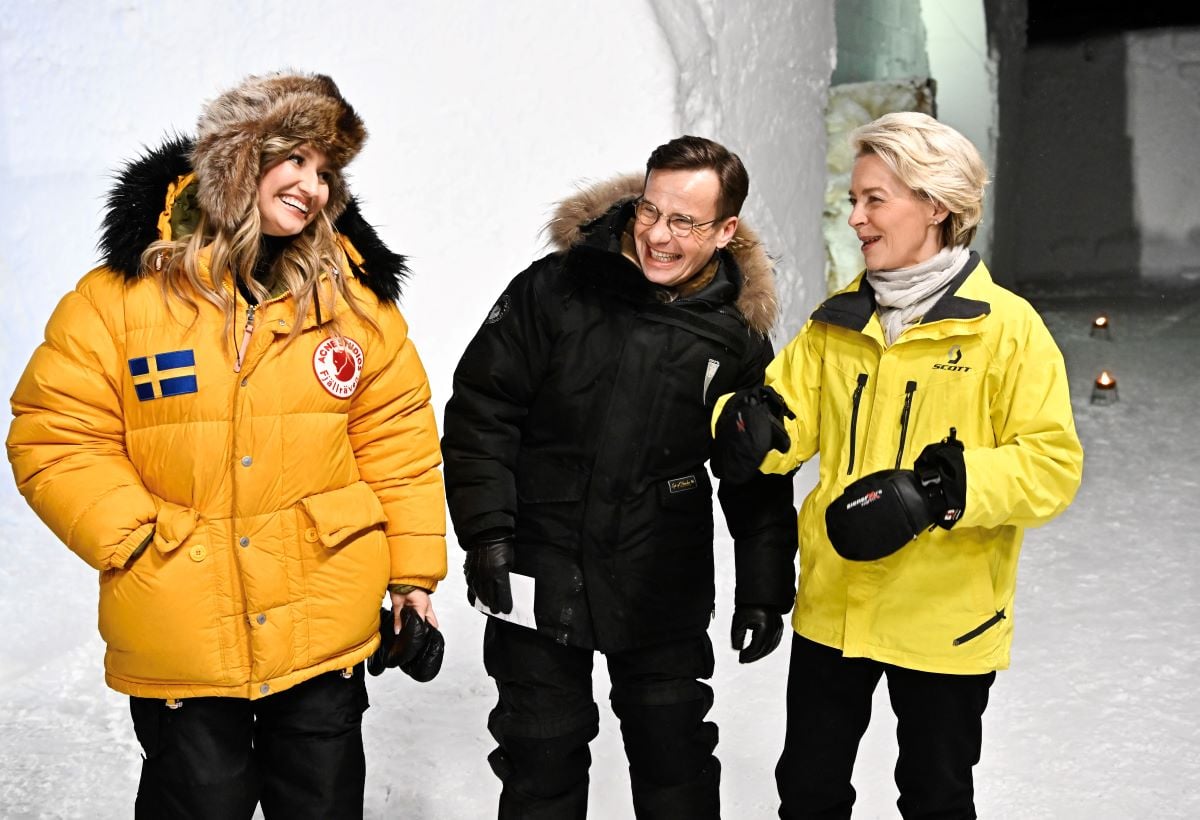
Deputy Prime Minister Ebba Busch, Prime Minister Ulf Kristersson and Ursula Von der Leyen, president of the European Commission, photographed at the Ice Hotel in Jukkasjärvi. Photo: Jonas Ekströmer/TT
2. Prime Minister's key aide resigns over illegal eel fishing
PM Nilsson, the journalist recruited to be a special advisor to Prime Minister Ulf Kristersson, resigned on January 26th in the government's first major scandal, after it emerged that he had lied to police about eel-fishing equipment he had been caught with in September 2021.
The disappearance of Nilsson, a former political editor of the Dagens Industri newspaper and who was to have been responsible for "political planning", left a gap in Kristersson's team.
In November, the situation was repeated after police launched an investigation into Johan Jakobsson, Kristersson's new right-hand man, for building an illegal extension to his wooden deck in the Stockholm Archipelago.
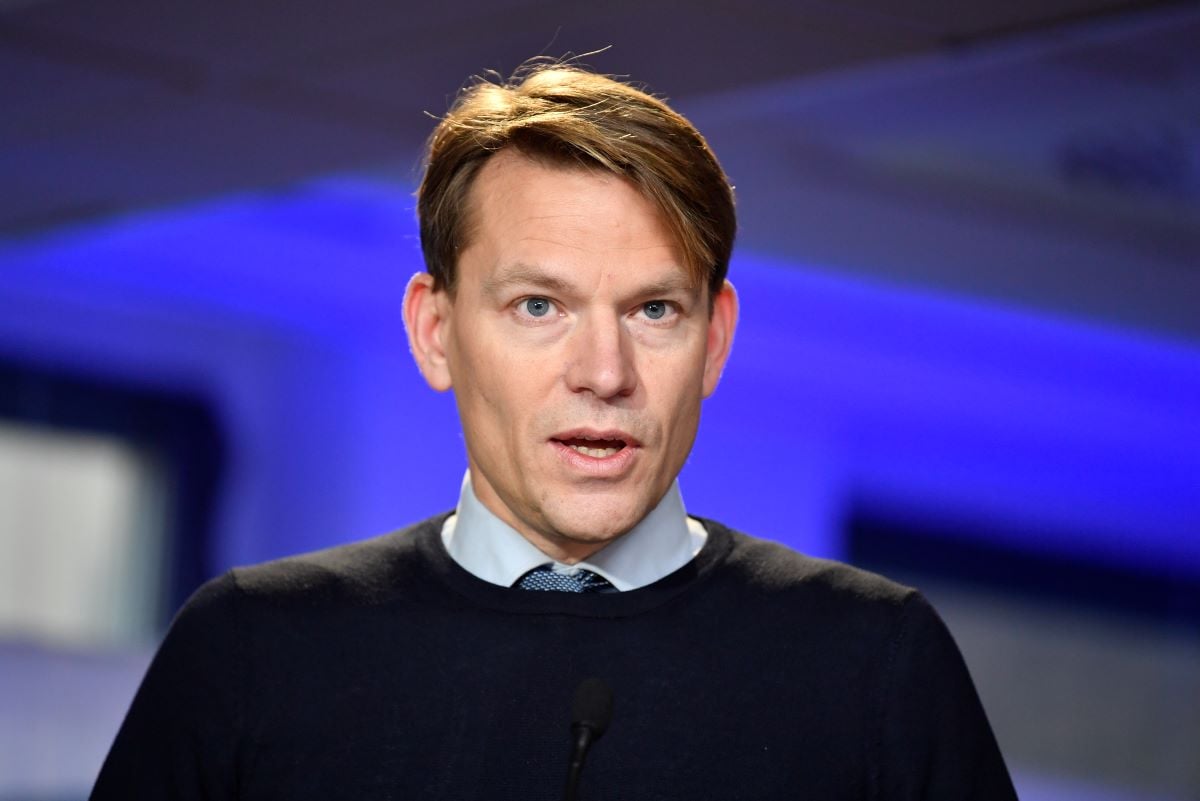
PM Nilsson resigned In January as the Prime Minister's special advisor after it emerged that he had lied to the police about illegal eel fishing. Photo: Anders Wiklund/TT
3. Muharrem Demirok elected new leader of the Centre Party
On February 2nd, Muharrem Demirok was elected the new leader of the Centre Party, beating off Elisabeth Thand Ringqvist, seen as representing the economically liberal Stockholm wing of the party, and Daniel Bäckström, seen as the candidate for the party's traditionally rural supporters.
Demirok has a Swedish mother and a Turkish Muslim father and is a member of the Church of Sweden, but he describes himself as a "cultural Muslim" and is therefore the first Muslim leader of a Swedish parliamentary party.
4. Party secretary of Christian Democrats resigns over 'me-too' investigation
On March 14th, Johan Ingerö, party secretary for the Christian Democrats, left his post "with immediate effect", after a party colleague, who later turned out to be the MEP Sara Skyttedal, reported him to the police for allegedly groping her after post-election celebrations in 2014.
Police dropped their inquiry in March because the events took place more than five years ago, beyond the limitation time for the crime.
The departure of Ingerö, who had been a key player in taking the party to the right on immigration and law and order, was yet another blow to the embattled Busch.
Skyttedal, a charismatic politician popular within the party, was in September removed from the the official list of MEP candidates ahead of the European election, only for the party's congress in November to vote, against Busch's wishes, for her to be put back on the list.
5. European Council reaches political agreement on Renewable Energy Directive
On March 30th came the first major success of Sweden's EU presidency, when the EU Council and the EU parliament reached agreement over changes to the Renewable Energy Directive, which would boost the goal for the share of renewable generation by 2030 from 32 percent to 42.5 percent.
At the summit, the EU council also voted through a plan to end all sales of petrol and diesel cars from 2035. Busch, Sweden's Business and Energy minister, said that the vote showed that Sweden was making a difference in climate and energy policy across the EU.
"The Swedish presidency has truly demonstrated that we are able to find solutions to difficult issues," she said. "We have absolutely played a role in all this."
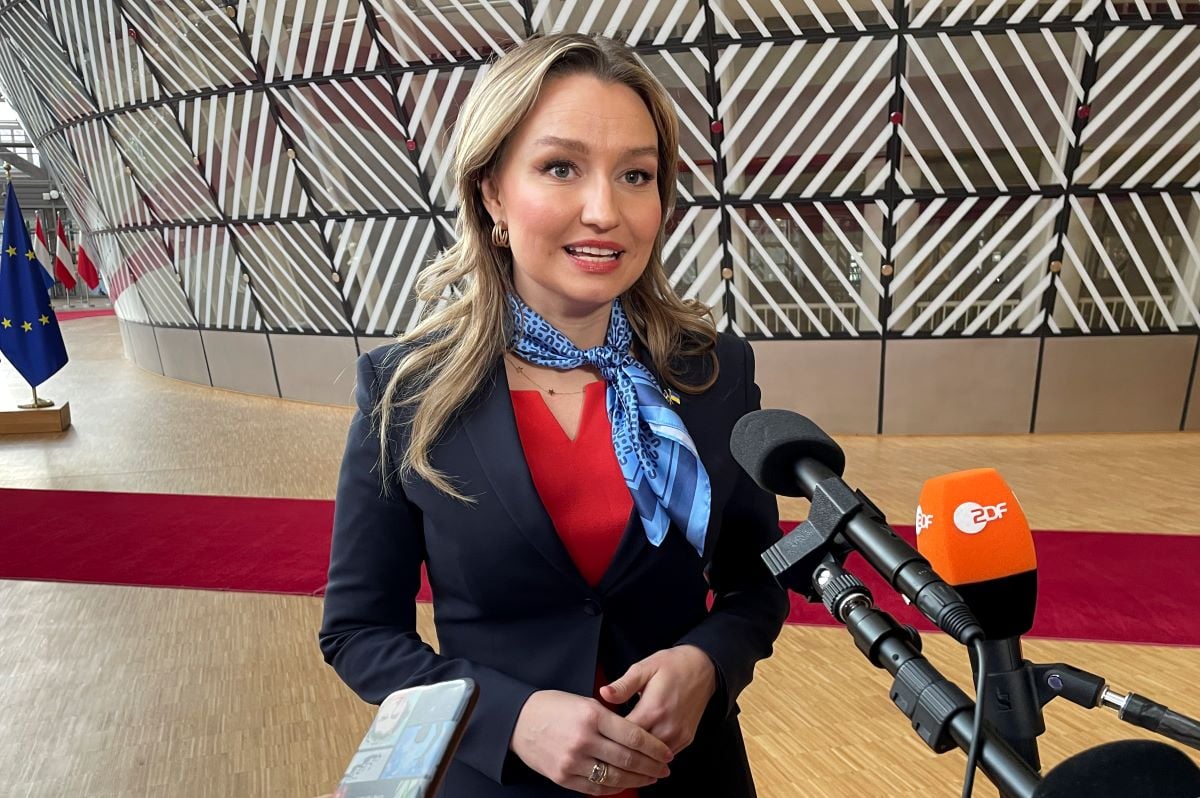
Ebba Busch at the European Council summit on March 30th. Photo: Wiktor Nummelin/TT
6. Swedish PM and migration minister visit Danish deportation agency
On April 26th, Prime Minister Ulf Kristersson and Maria Malmer Stenergard, Sweden's migration minister, visited the offices of the Danish agency tasked with deporting former refugees.
Kristersson met his Danish counterpart, Mette Frederiksen, during a visit to Hjemrejsestyrelsen, the Danish Return Agency, which is responsible for sending refugees back to their home countries if Denmark withdraws their asylum status or if they choose to leave the country.
The visit was significant in that it showed the government's eagerness to front the "paradigm shift" on immigration agreed with the far-right Sweden Democrats in the Tidö Agreement – the deal that gave Kristersson's government enough parliamentary support to take office.
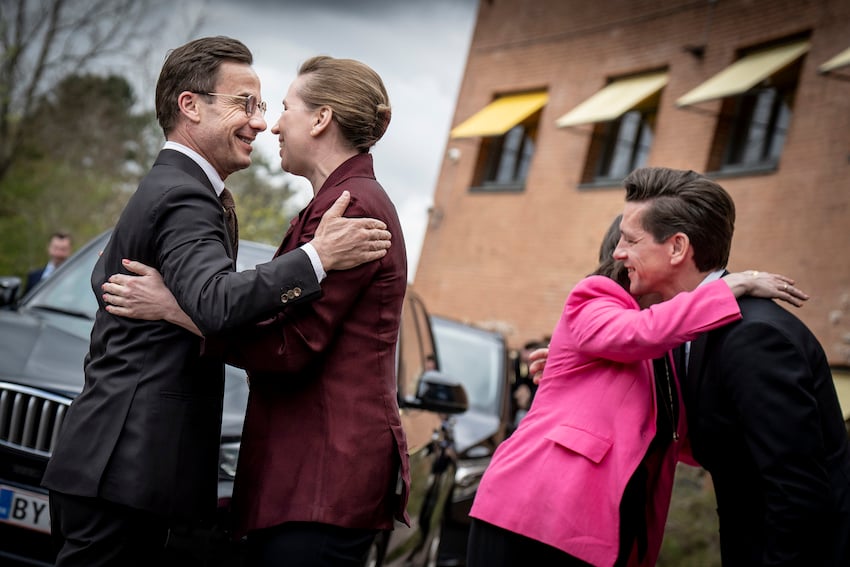
Danish Prime Minister Mette Frederiksen embraces Sweden's Prime Minister Ulf Kristersson. Photo: Mads Claus Rasmussen/Ritzau Scanpix/TT
7. Swedish politics has its 'here's Jimmie!' moment
After the election, the far-right Sweden Democrats, and particularly their leader Jimmie Åkesson, kept a low profile.
But in mid-April Åkesson returned after months of rest to launch a media blitz in which he revived the idea of Sweden leaving the European Union, calling Sweden's membership a "straitjacket", floated the idea of sending asylum seekers to processing centres outside the EU, and said that politicians should have some say over cultural events, if paid for by the taxpayer.
This was the government's first reminder of their dependence on the Sweden Democrats, and also showed that the far-right party was likely to get more radical rather than more moderate.
READ ALSO: Swedish politics has its 'here's Jimmie!' moment
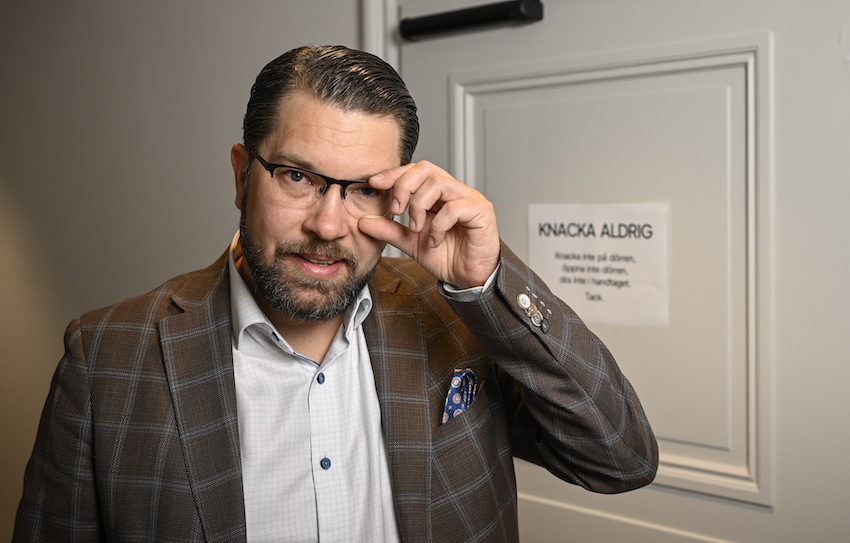
Sweden Democrat leader Jimmie Åkesson before an interview on April 29th with the TT newswire. Photo: Anders Wiklund/TT
8. Compensation for high electricity prices finally paid out
In the last week of May, compensation payments to households for the high electricity prices they faced in 2022 were finally paid out, more than six months later than the government parties had promised during the election campaign. All payments were completed by June 9th.
While this brought an end to the delays that had dogged the government, and particularly Ebba Busch, the energy minister, in its first six months, the recipients were not exactly grateful, with only 53 percent of people describing themselves as "satisfied" with the payments in one survey.
9. EU agrees key parts of migration deal
On June 8th, the European Council agreed key parts of its new migration deal, with "mandatory border procedures with faster processing", and a so-called "EU-wide solidarity pool" under which states with external borders would get funding to help them maintain border controls. The deal marked a second significant success for the Sweden's EU Presidency.
10. Quran-burning causes protests across Arab world
The Iraqi activist Salwan Momika on June 28th held a Quran-burning protest outside the main mosque in central Stockholm, at which he ripped pages out of the holy book and set fire to them.
A day after, the Quran-burning a mob marched on Sweden's embassy in Baghdad, with a few entering the building briefly before being made to leave by security.
In a statement, the government of Turkey said it was "unacceptable" to allow such "anti-Islamic actions" to take place "under the pretext of freedom of expression".
The protest came only two weeks before Nato's summit in Vilnius, leading to fears that Turkey's president, Recep Tayyip Erdogan, would use it as a pretext to block Sweden's Nato membership.
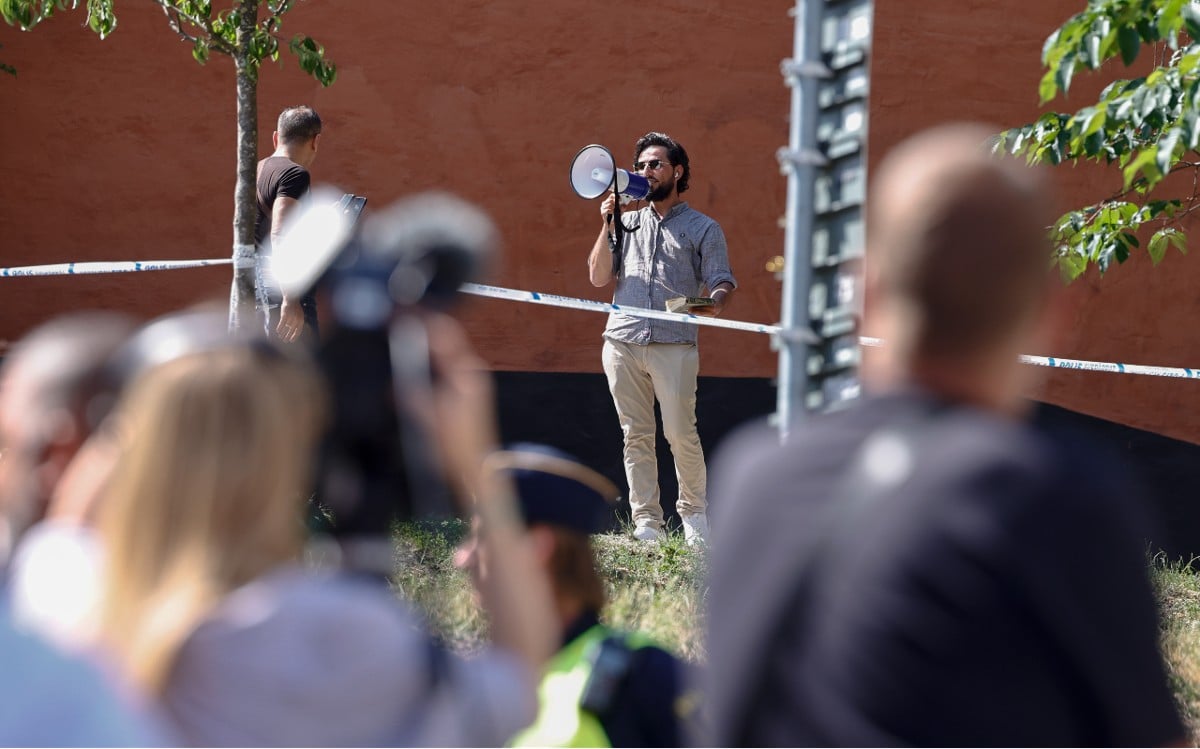
The Iraqi anti-Islam campaigner Salwan Momika burns a copy of the Quran outside the mosque in Stockholm. Photo: Stefan Jerrevång/TT
11. Turkish president promises to submit Sweden's Nato membership to parliament
At the Nato summit on July 11th, Turkey struck a new deal with Sweden, in which Erdogan agreed to forward the Accession Protocol for Sweden to the Grand National Assembly "as soon as possible" and to then work closely with the assembly to ensure ratification.
In return, Sweden pledged to "actively support efforts to reinvigorate Turkiye's EU accession process, including modernisation of the EU-Turkiye Customs Union and visa liberalisation".
After the summit was over, Erdogan quickly reverted to criticising Sweden.
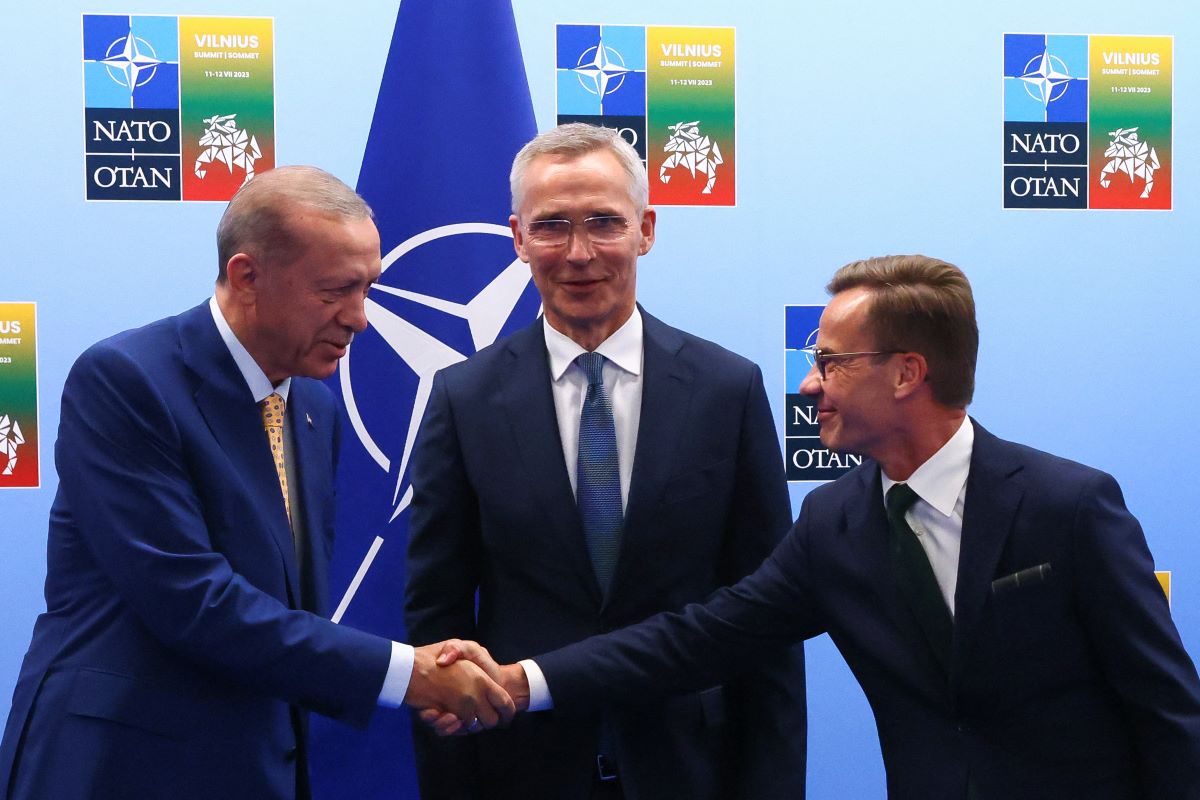 Swedish Prime Minister Ulf Kristersson (right) shakes hands with Turkish President Recep Tayyip Erdogan (right) after striking a deal over ratifying Sweden's Nato membership. Photo: Yves Herman/AFP
Swedish Prime Minister Ulf Kristersson (right) shakes hands with Turkish President Recep Tayyip Erdogan (right) after striking a deal over ratifying Sweden's Nato membership. Photo: Yves Herman/AFP
12. Calls for Sweden Democrat committee chair to resign over Mohammed tweet
While the government was still wrestling with Quran-burning protests, Richard Jomshof, the Sweden Democrat chair of the parliament's justice committee, worsened the situation by calling the Prophet Mohammed a "warlord, mass-murderer, slave trader and bandit" in a tweet on July 27th.
The Social Democrat opposition called for Jomshof to be removed from his position. Shortly afterwards, on August 3rd, Björn Söder – who like Jomshof is one of the "gang of four" who reformed the party in the mid-2000s – came under fire for linking the Stockholm Pride festival to pedophilia.
These mini-scandals were a further reminder of the difficulties of relying on the far-right party.
13. Sweden Democrats and government parties agree to slash biofuels obligation
Although the decision to slash the biofuels obligation, or reduktionsplikt, was a key part of the Tidö Agreement, it wasn't until August 5th that the three government parties struck an agreement with the Sweden Democrats to reduce the obligation to 6 percent.
The move would, the parties said, reduce the price of diesel at the pump by 5.5 kronor, while the price of petrol would only fall slightly.
The decision left a hole in Sweden's emissions reduction plan, making it likely that Sweden would miss its emissions goals for 2030 and also miss its goal for reduction in emissions from transport.
14. Government launches inquiry into 'tougher requirements for citizenship'
On September 7th, the government launched an inquiry into tougher requirements for citizenship, which included a proposal to extend the length of time newcomers have to be resident in Sweden to be eligible for citizenship from five years to eight.
The inquiry has been given until September 30th, 2024, to present its conclusions. with a draft law then scheduled to be presented to parliament in the autumn of 2025.
The inquiry is one of the most important parts of the so-called "paradigm shift" in migration policy announced by the government.
15. Prime Minister Ulf Kristersson holds 'speech to the nation' on gang crime
In the last week of September, gang violence peaked in Sweden, with three killings in the space of 24 hours.
Kristersson responded with a televised "speech to the nation", a relatively rare event in Swedish politics.
The speech did not, however, go down well, with even commentators on the right, such as Peter Wennblad at Svenska Dagbladet, complaining that by casting blame for Sweden's problems with gang violence on previous governments, Kristersson had been too political.
This, his critics argued, was inappropriate for a "speech to the nation", which called on prime ministers to seek to unite everyone in Sweden.
The speech will mark a key moment in the government, as it was the point where Kristersson's shortcomings as a so-called landsfader, or "father of the county", became a dominant part of the narrative.
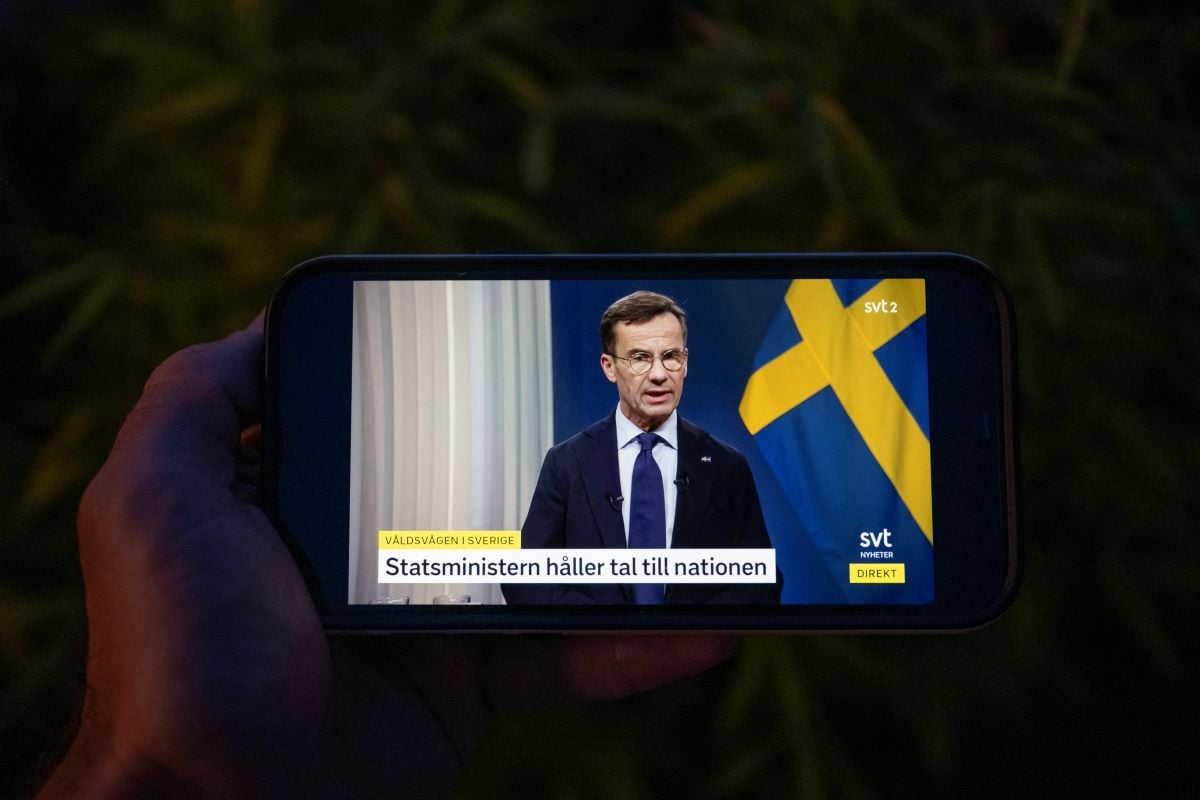
Ulf Kristersson's speech was broadcast live on SVT and TV4. Photo: Jonathan Nackstrand/AFP
16. Draft budget reveals sharp rise in carbon emissions
Sweden's government on September 31st published its proposal for the 2024 budget. In an appendix, the government's own figures revealed that as a result of its policies emissions would increase by 5.9 to 9.8 million tonnes of carbon dioxide equivalent (MtCO2) by 2030, making it unlikely that Sweden will be able to reach its 2030 emissions goals.
17. Dispute in the Green Party breaks out into the open
On October 4th, a dispute in the green party broke into the open with the Dagens Nyheter newspaper reporting alarm from within the party's parliamentary organisation over the "toxic leadership style" of its joint leader Märtha Stenevi.
On October 19th, the internal battle hit the headlines again when the party's nomination committee put forward Daniel Helldén, the former councillor in charge of transport in Stockholm, as its proposal for the new spokesperson.
The Svenska Dagbladet newspaper reported that Stenevi had returned to her home in Malmö to avoid taking part in a press conference with Helldén, which Stenevi denied. The party then reported on October 21st that it had launched a formal internal investigation into Stenevi's leadership style.
At the party congress on November 25th, Helldén managed to beat his rival Magnus P Wåhlin to the leadership by just one vote.
Helldén is likely to increase the party's focus on climate, energy and transport politics.
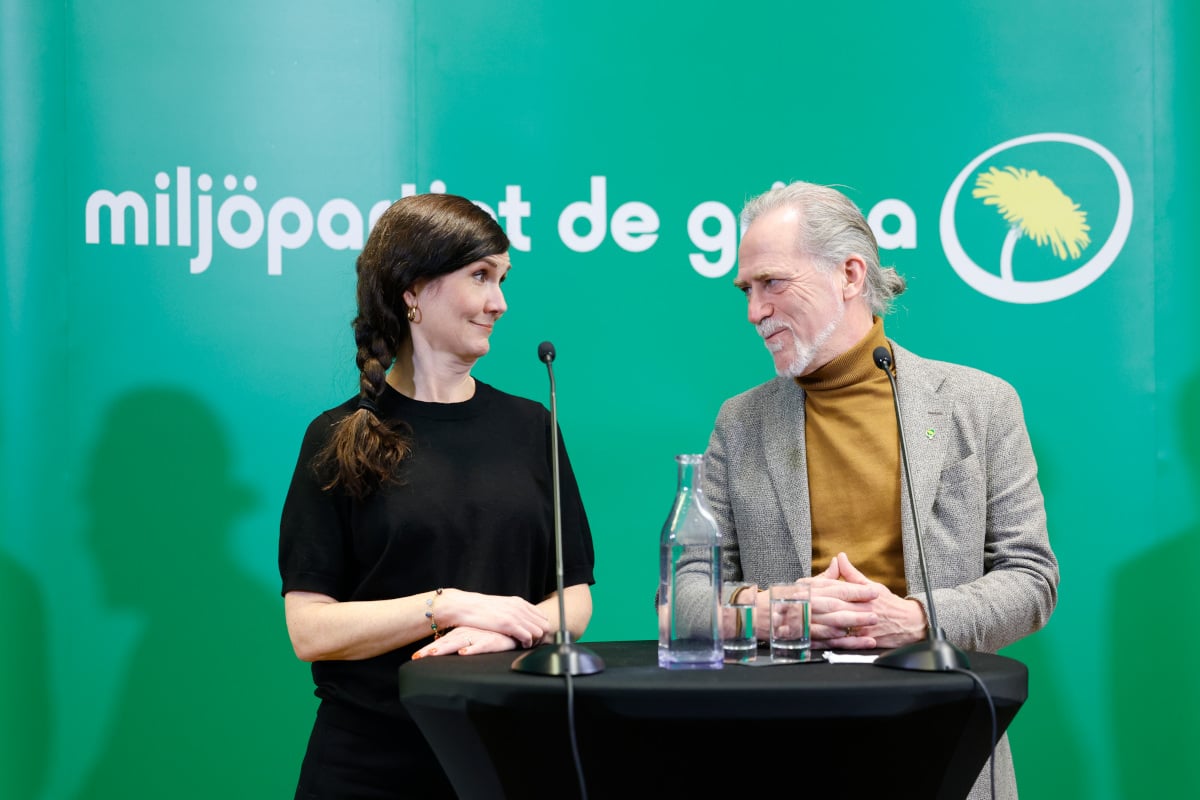
Green Party leaders Märta Stenevi and Daniel Helldén. Photo: Christine Olsson/TT
18. Turkey's President Erdogan submits Sweden's accession protocol to the Turkish parliament
It took more than four months from Nato's summit in Vilnius for Turkey's President Recep Tayyip Erdogan to finally submit Sweden's membership to the Turkish parliament for approval on October 27th. The protocol is at the time of writing still stuck with the Turkish parliament's Foreign Affairs Committee.
19. Sweden Democrat leader Jimmie Åkesson calls for mosques to be demolished
In April, the Sweden Democrats' leader Jimmie Åkesson had shaken up Swedish politics by putting leaving the European Union back on the agenda. At the party's congress on November 25th he repeated the trick with his most radical speech on Islam in more than a decade.
Åkesson called for mosques to be demolished and described the Social Democrats as "an arm of the Islamist movement".
The speech was sufficiently extreme to generate a rebuke from Prime Minister Ulf Kristersson, with a story then leaked to the Expressen that the Kristersson had rung Åkesson for "a stern conversation".
The Sweden Democrats rejected this saying that neither Åkesson, nor his party, would be willing to accept a dressing down.
20. Social Democrats claim Sweden Democrats not Moderates are now 'main opponent'
In its strategy published ahead of EU elections on June 9th, 2024, the Social Democrats said that the had changed its "main opponent" from the Moderates to the Sweden Democrats.
"We would have loved to have the Moderates as our main opponent, but they're quite simply irrelevant," the party's secretary Tobias Baudin told Dagens Nyheter in a newspaper. "They are much too small as a party".
This was the first such shift since the early 1980s, when the Moderates eclipsed the Centre Party as the main party on the right-wing bloc.
Whether this was meant seriously, or was an attempt to humiliate the Moderate Party's for its reliance on the far-right, it made a good way for the opposition to bookmark the end of the three-party coalition's first year in power.
Comments
See Also
1. Dressing up warm to launch Sweden's EU presidency
The government started the year in the global spotlight with the launch of Sweden's six-month EU presidency.
On January 12th, Sweden shipped Brussels journalists to Arctic Sweden to stay at the Ice Hotel, alongside Prime Minister Ulf Kristersson, Deputy Prime Minister Ebba Busch, and President of the European Commission Ursula von der Leyen.
It was a smart strategy to gain journalists' favour, and the state-owned iron ore mining company LKAB even timed a major announcement for their arrival, revealing on the day that it had discovered Europe’s largest deposit of rare earth metals nearby.
The trip, however, brought problems domestically, with Busch and Kristersson ridiculed for dressing up as if they were going on a polar expedition, even though it was above freezing.

2. Prime Minister's key aide resigns over illegal eel fishing
PM Nilsson, the journalist recruited to be a special advisor to Prime Minister Ulf Kristersson, resigned on January 26th in the government's first major scandal, after it emerged that he had lied to police about eel-fishing equipment he had been caught with in September 2021.
The disappearance of Nilsson, a former political editor of the Dagens Industri newspaper and who was to have been responsible for "political planning", left a gap in Kristersson's team.
In November, the situation was repeated after police launched an investigation into Johan Jakobsson, Kristersson's new right-hand man, for building an illegal extension to his wooden deck in the Stockholm Archipelago.

On February 2nd, Muharrem Demirok was elected the new leader of the Centre Party, beating off Elisabeth Thand Ringqvist, seen as representing the economically liberal Stockholm wing of the party, and Daniel Bäckström, seen as the candidate for the party's traditionally rural supporters.
Demirok has a Swedish mother and a Turkish Muslim father and is a member of the Church of Sweden, but he describes himself as a "cultural Muslim" and is therefore the first Muslim leader of a Swedish parliamentary party.
4. Party secretary of Christian Democrats resigns over 'me-too' investigation
On March 14th, Johan Ingerö, party secretary for the Christian Democrats, left his post "with immediate effect", after a party colleague, who later turned out to be the MEP Sara Skyttedal, reported him to the police for allegedly groping her after post-election celebrations in 2014.
Police dropped their inquiry in March because the events took place more than five years ago, beyond the limitation time for the crime.
The departure of Ingerö, who had been a key player in taking the party to the right on immigration and law and order, was yet another blow to the embattled Busch.
Skyttedal, a charismatic politician popular within the party, was in September removed from the the official list of MEP candidates ahead of the European election, only for the party's congress in November to vote, against Busch's wishes, for her to be put back on the list.
5. European Council reaches political agreement on Renewable Energy Directive
On March 30th came the first major success of Sweden's EU presidency, when the EU Council and the EU parliament reached agreement over changes to the Renewable Energy Directive, which would boost the goal for the share of renewable generation by 2030 from 32 percent to 42.5 percent.
At the summit, the EU council also voted through a plan to end all sales of petrol and diesel cars from 2035. Busch, Sweden's Business and Energy minister, said that the vote showed that Sweden was making a difference in climate and energy policy across the EU.
"The Swedish presidency has truly demonstrated that we are able to find solutions to difficult issues," she said. "We have absolutely played a role in all this."

6. Swedish PM and migration minister visit Danish deportation agency
On April 26th, Prime Minister Ulf Kristersson and Maria Malmer Stenergard, Sweden's migration minister, visited the offices of the Danish agency tasked with deporting former refugees.
Kristersson met his Danish counterpart, Mette Frederiksen, during a visit to Hjemrejsestyrelsen, the Danish Return Agency, which is responsible for sending refugees back to their home countries if Denmark withdraws their asylum status or if they choose to leave the country.
The visit was significant in that it showed the government's eagerness to front the "paradigm shift" on immigration agreed with the far-right Sweden Democrats in the Tidö Agreement – the deal that gave Kristersson's government enough parliamentary support to take office.

7. Swedish politics has its 'here's Jimmie!' moment
After the election, the far-right Sweden Democrats, and particularly their leader Jimmie Åkesson, kept a low profile.
But in mid-April Åkesson returned after months of rest to launch a media blitz in which he revived the idea of Sweden leaving the European Union, calling Sweden's membership a "straitjacket", floated the idea of sending asylum seekers to processing centres outside the EU, and said that politicians should have some say over cultural events, if paid for by the taxpayer.
This was the government's first reminder of their dependence on the Sweden Democrats, and also showed that the far-right party was likely to get more radical rather than more moderate.
READ ALSO: Swedish politics has its 'here's Jimmie!' moment

8. Compensation for high electricity prices finally paid out
In the last week of May, compensation payments to households for the high electricity prices they faced in 2022 were finally paid out, more than six months later than the government parties had promised during the election campaign. All payments were completed by June 9th.
While this brought an end to the delays that had dogged the government, and particularly Ebba Busch, the energy minister, in its first six months, the recipients were not exactly grateful, with only 53 percent of people describing themselves as "satisfied" with the payments in one survey.
9. EU agrees key parts of migration deal
On June 8th, the European Council agreed key parts of its new migration deal, with "mandatory border procedures with faster processing", and a so-called "EU-wide solidarity pool" under which states with external borders would get funding to help them maintain border controls. The deal marked a second significant success for the Sweden's EU Presidency.
10. Quran-burning causes protests across Arab world
The Iraqi activist Salwan Momika on June 28th held a Quran-burning protest outside the main mosque in central Stockholm, at which he ripped pages out of the holy book and set fire to them.
A day after, the Quran-burning a mob marched on Sweden's embassy in Baghdad, with a few entering the building briefly before being made to leave by security.
In a statement, the government of Turkey said it was "unacceptable" to allow such "anti-Islamic actions" to take place "under the pretext of freedom of expression".
The protest came only two weeks before Nato's summit in Vilnius, leading to fears that Turkey's president, Recep Tayyip Erdogan, would use it as a pretext to block Sweden's Nato membership.

11. Turkish president promises to submit Sweden's Nato membership to parliament
At the Nato summit on July 11th, Turkey struck a new deal with Sweden, in which Erdogan agreed to forward the Accession Protocol for Sweden to the Grand National Assembly "as soon as possible" and to then work closely with the assembly to ensure ratification.
In return, Sweden pledged to "actively support efforts to reinvigorate Turkiye's EU accession process, including modernisation of the EU-Turkiye Customs Union and visa liberalisation".
After the summit was over, Erdogan quickly reverted to criticising Sweden.

12. Calls for Sweden Democrat committee chair to resign over Mohammed tweet
While the government was still wrestling with Quran-burning protests, Richard Jomshof, the Sweden Democrat chair of the parliament's justice committee, worsened the situation by calling the Prophet Mohammed a "warlord, mass-murderer, slave trader and bandit" in a tweet on July 27th.
The Social Democrat opposition called for Jomshof to be removed from his position. Shortly afterwards, on August 3rd, Björn Söder – who like Jomshof is one of the "gang of four" who reformed the party in the mid-2000s – came under fire for linking the Stockholm Pride festival to pedophilia.
These mini-scandals were a further reminder of the difficulties of relying on the far-right party.
13. Sweden Democrats and government parties agree to slash biofuels obligation
Although the decision to slash the biofuels obligation, or reduktionsplikt, was a key part of the Tidö Agreement, it wasn't until August 5th that the three government parties struck an agreement with the Sweden Democrats to reduce the obligation to 6 percent.
The move would, the parties said, reduce the price of diesel at the pump by 5.5 kronor, while the price of petrol would only fall slightly.
The decision left a hole in Sweden's emissions reduction plan, making it likely that Sweden would miss its emissions goals for 2030 and also miss its goal for reduction in emissions from transport.
14. Government launches inquiry into 'tougher requirements for citizenship'
On September 7th, the government launched an inquiry into tougher requirements for citizenship, which included a proposal to extend the length of time newcomers have to be resident in Sweden to be eligible for citizenship from five years to eight.
The inquiry has been given until September 30th, 2024, to present its conclusions. with a draft law then scheduled to be presented to parliament in the autumn of 2025.
The inquiry is one of the most important parts of the so-called "paradigm shift" in migration policy announced by the government.
15. Prime Minister Ulf Kristersson holds 'speech to the nation' on gang crime
In the last week of September, gang violence peaked in Sweden, with three killings in the space of 24 hours.
Kristersson responded with a televised "speech to the nation", a relatively rare event in Swedish politics.
The speech did not, however, go down well, with even commentators on the right, such as Peter Wennblad at Svenska Dagbladet, complaining that by casting blame for Sweden's problems with gang violence on previous governments, Kristersson had been too political.
This, his critics argued, was inappropriate for a "speech to the nation", which called on prime ministers to seek to unite everyone in Sweden.
The speech will mark a key moment in the government, as it was the point where Kristersson's shortcomings as a so-called landsfader, or "father of the county", became a dominant part of the narrative.

16. Draft budget reveals sharp rise in carbon emissions
Sweden's government on September 31st published its proposal for the 2024 budget. In an appendix, the government's own figures revealed that as a result of its policies emissions would increase by 5.9 to 9.8 million tonnes of carbon dioxide equivalent (MtCO2) by 2030, making it unlikely that Sweden will be able to reach its 2030 emissions goals.
17. Dispute in the Green Party breaks out into the open
On October 4th, a dispute in the green party broke into the open with the Dagens Nyheter newspaper reporting alarm from within the party's parliamentary organisation over the "toxic leadership style" of its joint leader Märtha Stenevi.
On October 19th, the internal battle hit the headlines again when the party's nomination committee put forward Daniel Helldén, the former councillor in charge of transport in Stockholm, as its proposal for the new spokesperson.
The Svenska Dagbladet newspaper reported that Stenevi had returned to her home in Malmö to avoid taking part in a press conference with Helldén, which Stenevi denied. The party then reported on October 21st that it had launched a formal internal investigation into Stenevi's leadership style.
At the party congress on November 25th, Helldén managed to beat his rival Magnus P Wåhlin to the leadership by just one vote.
Helldén is likely to increase the party's focus on climate, energy and transport politics.

18. Turkey's President Erdogan submits Sweden's accession protocol to the Turkish parliament
It took more than four months from Nato's summit in Vilnius for Turkey's President Recep Tayyip Erdogan to finally submit Sweden's membership to the Turkish parliament for approval on October 27th. The protocol is at the time of writing still stuck with the Turkish parliament's Foreign Affairs Committee.
19. Sweden Democrat leader Jimmie Åkesson calls for mosques to be demolished
In April, the Sweden Democrats' leader Jimmie Åkesson had shaken up Swedish politics by putting leaving the European Union back on the agenda. At the party's congress on November 25th he repeated the trick with his most radical speech on Islam in more than a decade.
Åkesson called for mosques to be demolished and described the Social Democrats as "an arm of the Islamist movement".
The speech was sufficiently extreme to generate a rebuke from Prime Minister Ulf Kristersson, with a story then leaked to the Expressen that the Kristersson had rung Åkesson for "a stern conversation".
The Sweden Democrats rejected this saying that neither Åkesson, nor his party, would be willing to accept a dressing down.
20. Social Democrats claim Sweden Democrats not Moderates are now 'main opponent'
In its strategy published ahead of EU elections on June 9th, 2024, the Social Democrats said that the had changed its "main opponent" from the Moderates to the Sweden Democrats.
"We would have loved to have the Moderates as our main opponent, but they're quite simply irrelevant," the party's secretary Tobias Baudin told Dagens Nyheter in a newspaper. "They are much too small as a party".
This was the first such shift since the early 1980s, when the Moderates eclipsed the Centre Party as the main party on the right-wing bloc.
Whether this was meant seriously, or was an attempt to humiliate the Moderate Party's for its reliance on the far-right, it made a good way for the opposition to bookmark the end of the three-party coalition's first year in power.
Join the conversation in our comments section below. Share your own views and experience and if you have a question or suggestion for our journalists then email us at [email protected].
Please keep comments civil, constructive and on topic – and make sure to read our terms of use before getting involved.
Please log in here to leave a comment.